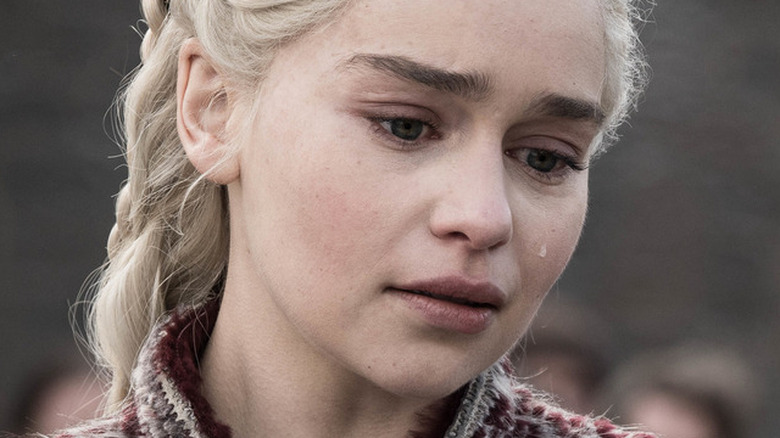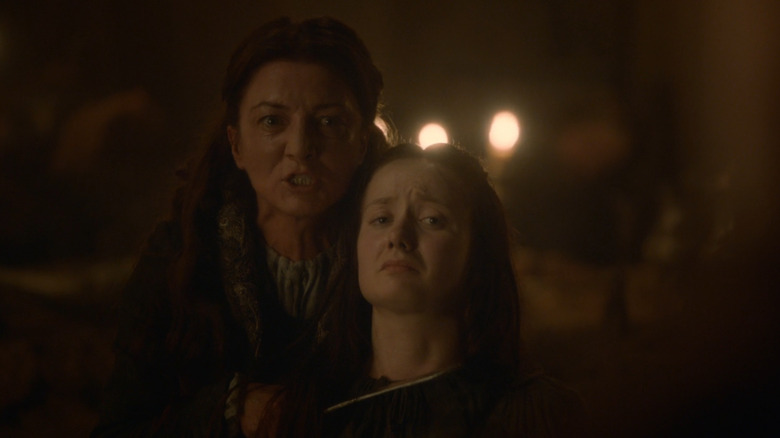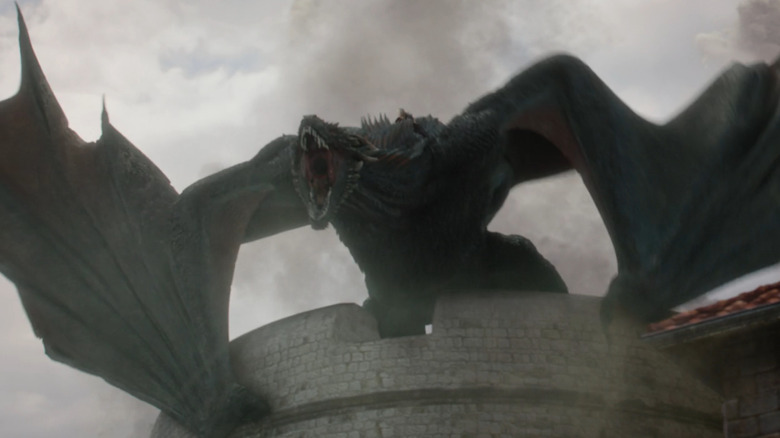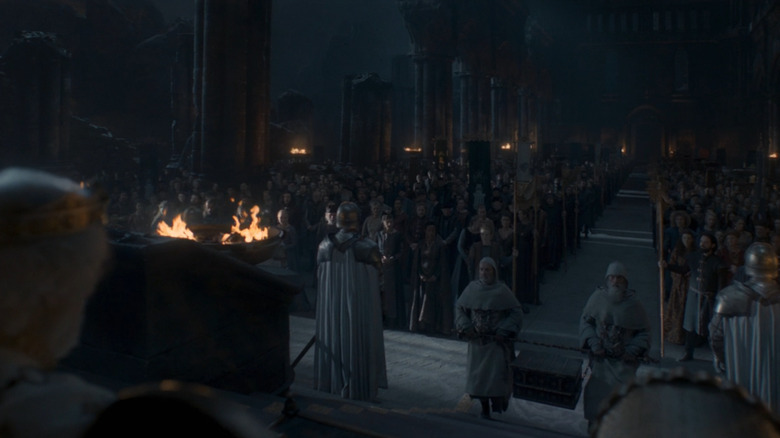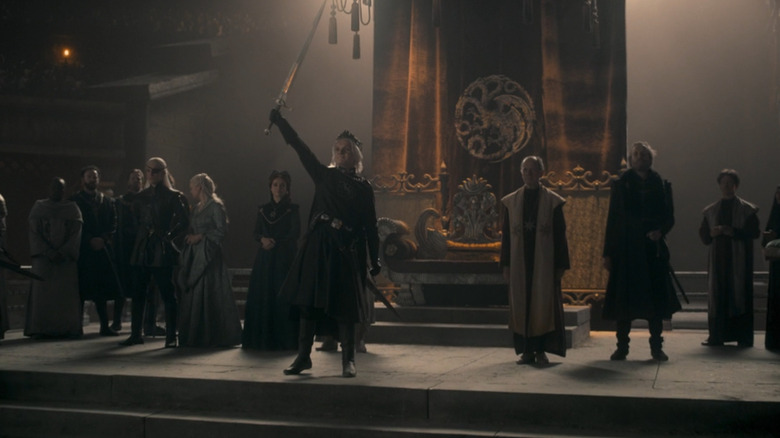House Of The Dragon's Age Of Peace Is A Stark Contrast To Game Of Thrones
Westeros, Essos, and the Shadow Lands of Asshai are rife with different cultures, religions, and people. Each continent has its own distinct rules and rulers, with the most notable being that of Westeros, or as it is commonly referred to in "Game of Thrones," the Seven Kingdoms. This land is typically divided into individual areas that are led by a specific house or family with names like Stark, Tyrell, Lannister, and Baratheon. From there, these regional lords have a collection of families that have sworn loyalty to said houses, which tends to give each a fairly sizable army of conscripts should military conflict ever arise.
It is also worth mentioning that on the continent of Westeros, there are a collection of "free people" north of The Wall, where they do not kneel or yield to any king because of birthright, which is definitely a part of their heritage. Across the Narrow Sea, Essos is populated by mercantile cities, slavers, and pillaging nomads known as the Dothraki. In other words, the world featured in both "Game of Thrones" and "House of the Dragon" can be a powder-keg of latent power struggles and conflict that can be set ablaze on the slightest provocation, and that isn't even mentioning the more grievous actions and motivations of both of these series, like when Walder Frey (David Bradley) executes the event known as "The Red Wedding."
Game of Thrones features near endless conflict
For a time, "Game of Thrones" absolutely dominated the pop culture zeitgeist with water-cooler discussions, podcasts, merchandise, jokes, and references. After every new episode, one could probably expect an entire deluge of commentary, analyzing every single aspect of the popular show. The draw of "Game of Thrones" can be for all sorts of reasons, like its fantasy setting, interpersonal drama and scheming, violence, and fantastic actors and dialogue. From the very first season of "Game of Thrones," fans quickly learn that nobody is safe from the specter of death, and even fan-favorite characters aren't immune to death, which is probably best highlighted by the tragic end of Ned Stark (Sean Bean). After this character's death, the entire continent of Westeros is plunged into conflict that sees families declare allegiances. Meanwhile, the slow ascent of Daenerys Targaryen (Emilia Clarke) on the continent of Essos is also marked by fire and blood, which eventually sees her subjugate the area.
Speaking to The Independent, author George R.R. Martin explained the impact of the famous Red Wedding event and said, "It's a horrible chapter, and it upsets people. It makes people angry, it makes people sad. People throw the book against the wall or into the fireplace. When it was on TV, it had the same effect on tens of thousands, if not millions, of people. To my mind, that's good. We're talking about death here!" Needless to say, "Game of Thrones" never really had a moment of long-lasting peace, and the almost global conflict meant that nobody was safe.
Countless lives are lost during the conflicts in Game of Thrones
Considering that "Game of Thrones" ran for eight seasons, audience members were treated to violence, death, and conflict on both a personal and massive scale. From the intimate and up-close assassination work of "The Faceless Men" and Arya Stark (Maisie Williams), to the infamous Wildfire boat detonation in Black Water Bay, to Daenerys unleashing her dragons on her enemies, death comes easy in "Game of Thrones," and at no point in the series is there really a long lasting moment where the people can breathe easy, though it is assumed that Bran Stark (Isaac Hempstead Wright) would lead the world in a new era of peace, mainly due to his abilities as the Three-Eyed Raven and his time-spanning clairvoyance.
According to Statista, there were at least 5,863 deaths in "Game of Thrones," but that isn't even considering the amount of civilian and war causalities that may have occurred off-screen. Just think about how many countless innocent lives were lost during both attacks on King's Landing — the invasion of Stannis (Stephen Dillane) and later Daenerys' assault on the city via dragonback. In addition, how many wildling lives were lost during the attack on The Wall, Hardhome, or Winterfell? When one thinks about all of the death and conflict that occurs in "Game of Thrones," it is truly amazing that the world isn't a smoldering pile of ash and ruins like Old Valyria.
Jaehaerys and Viserys presided over 79 years of relative peace
In an interview with Entertainment Weekly, "House of the Dragon" showrunner Ryan Condal explained how the setting in the prequel, which is set over 100 years before its predecessor show, differs greatly by saying, "Nobody alive in this story has ever seen a war or a meaningful conflict. Yes, there have been skirmishes and tournaments, but we're living in this society based on conflicts for power. We're watching a period of time where every man has been trained for battle since birth, but battle doesn't happen. That pent-up energy leaks out between the cracks and starts to wear on itself where you almost need the release of war in order to keep the whole thing from boiling over."
This makes sense for those with a keen understanding of Westerosi history. The grandfather of King Viserys (Paddy Considine), named Jaehaerys I Targaryen, earned such monikers as "The Wise" and "The Conciliator" for his even-handed approach to leadership that resulted in a time of great peace for the continent, which lasted for 53 years. Likewise, the reign of King Viserys also saw Westeros in a relatively peaceful time, with the exception of the border conflict involving the area known as the Stepstones. King Viserys ruled for 26 years, so between Viserys and his grandfather of Jaeharys, Westeros sees around 79 years of relative peace and prosperity.
The peace in House of the Dragon is shattered by infighting
Of course, as anybody who is caught up with "House of the Dragon" might tell you, this long peace has been finally fractured by long-simmering animosities and politicking in the wake of Viserys' death. An internal power struggle that is fated to utterly decimate the Targaryens, this generational conflict will eventually lead to the events of "Game of Thrones," where the majesty of the Targaryen rule has been either regulated to the history books or looked at with some kind of contempt, mainly due to the actions of the Mad King Aerys II. Never quite fully recovering from the conflict that started in "House of the Dragon," the commoners of Westeros don't really understand what a prolonged peace really looks like.
Speaking with the Hollywood Reporter, HBO Max content chief Casey Bloys explained the appeal of "House of the Dragon" as a worthy successor to "Game of Thrones" by saying, "I liked the idea of focusing on one family, and obviously the Targaryens have a lot of drama to go around. I also liked the echo of how empires can quickly fall — those are the types of conversations we are having in our own country, which I don't think is anything I would've thought we'd be talking about 20 years ago." Ultimately, the era of peace in and before "House of the Dragon" highlights just how quickly the serenity can be shattered by the machinations of the few and to the detriment of all.
